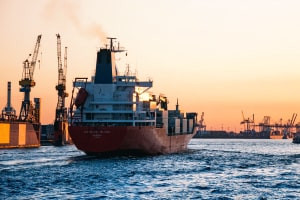Maritime Logistics es un diplomado en línea gratuito que comienza con una introducción a los patrones del comercio mundial, así como a la forma en que estos patrones afectan al comercio mundial. También le presenta las diferencias entre el transporte intermodal y multimodal, así como los principales mercados de transporte marítimo. El material también abordará el concepto básico de «cadena de suministro», así como los principios y factores de gestión de la cadena de suministro que influyen en las operaciones
de la cadena de suministro.
A continuación, este curso explica por qué los barcos son importantes en el transporte, así como los conceptos básicos de un buque de carga general. Aprenderá sobre los diferentes aspectos de las operaciones navales en lo que respecta al transporte, los procesos logísticos marítimos, así como los acuerdos de fletamento. Domine las características de la carga fraccionada a granel, así como la forma de desarrollar un plan de estiba adecuado y los tipos de condiciones de envío regulados por los Incoterms
.
Además, este curso le ayudará a familiarizarse con las operaciones de carga y descarga del transporte marítimo, así como con la información que se intercambia en la lista de verificación previa a la llegada. Aprenderá cómo la digitalización influye en la logística marítima, así como cómo las diferentes tecnologías son aplicables a la gestión moderna
de la cadena de suministro.
Conoce lo que aprenderás en este curso gratuito
Ver Todos los resultados de aprendizaje Ver menos Todos los cursos de Alison son gratuitos para inscribirse, estudiar y completar. Para completar con éxito esta diplomatura y convertirte en un Graduado de Alison, debes obtener un 80% o más en cada evaluación del curso.
Una vez que hayas completado esta diplomatura, tienes la opción de adquirir un Diploma oficial, que es una excelente manera de compartir tu logro con el mundo.
Su certificado de Alison es:
- Ideal para compartir con posibles empleadores.
- Excelente para tu CV, perfiles profesionales en redes sociales y solicitudes de empleo.
- Una muestra de tu compromiso con seguir aprendiendo, desarrollar nuevas habilidades y obtener grandes resultados.
- Un incentivo para que sigas empoderándote a través del aprendizaje continuo.
Alison ofrece 2 tipos de diploma para las Diplomaturas completadas:
- Diploma Digital: un Diploma descargable en formato PDF, disponible inmediatamente para ti cuando completes tu compra.
- Diploma Físico: una versión física de tu Diploma oficialmente autenticado y con marcas de seguridad
Todos los Diplomas están disponibles para su compra a través de la Tienda Alison. Para obtener más información sobre la compra de Diplomas de Alison, visita nuestras Preguntas Frecuentes. Si decides no comprar tu Diploma de Alison, aún puedes demostrar tu logro con la opción de compartir tu Registro de Aprendizaje o Verificación de Logro de Aprendizaje, ambos accesibles desde tu Configuración de Cuenta.











 Horas promedio
Horas promedio  Contiene video
Contiene video  Acreditado por CPD
Acreditado por CPD 

 XP Total:
XP Total: 
 Conocimientos y habilidades que aprenderás
Conocimientos y habilidades que aprenderás 






